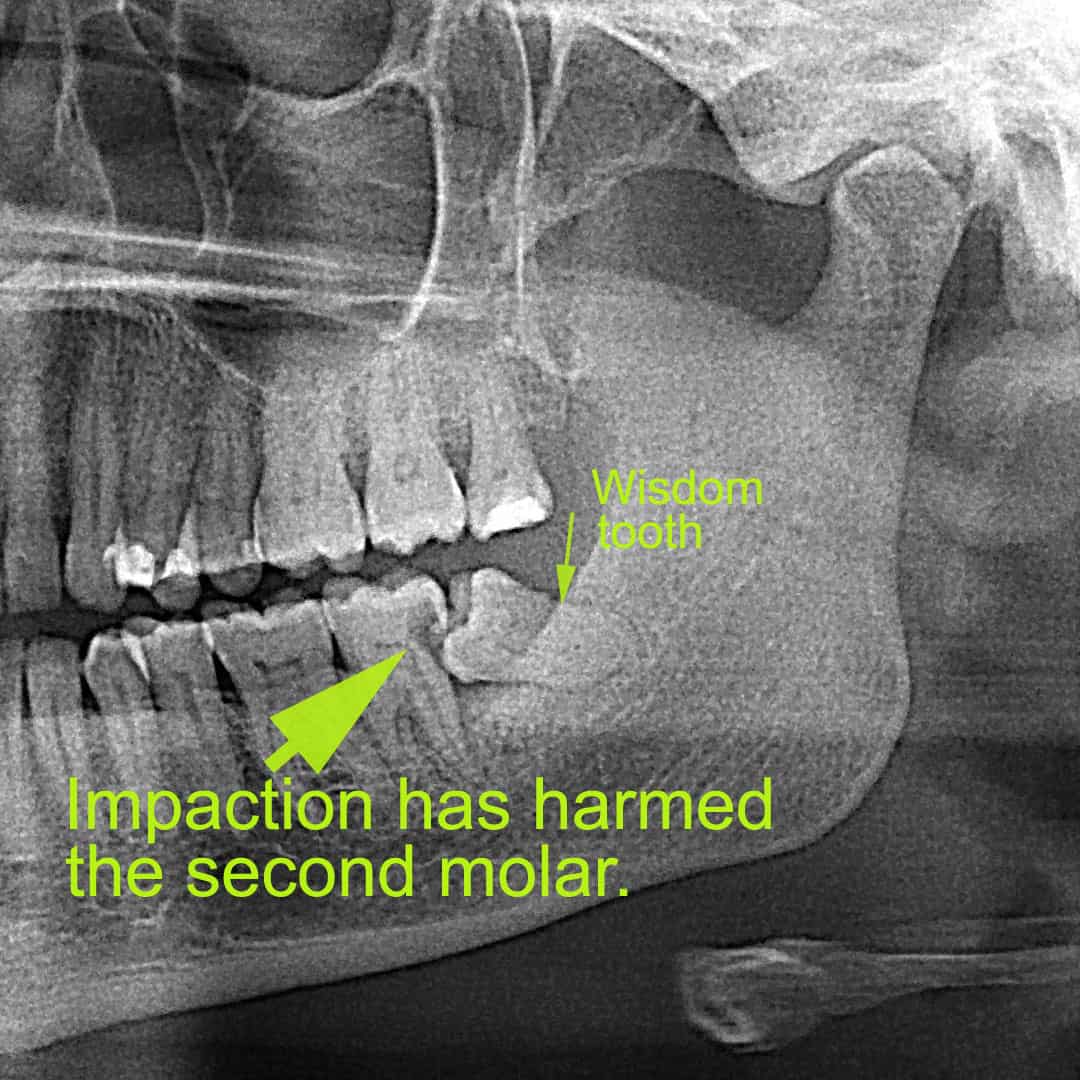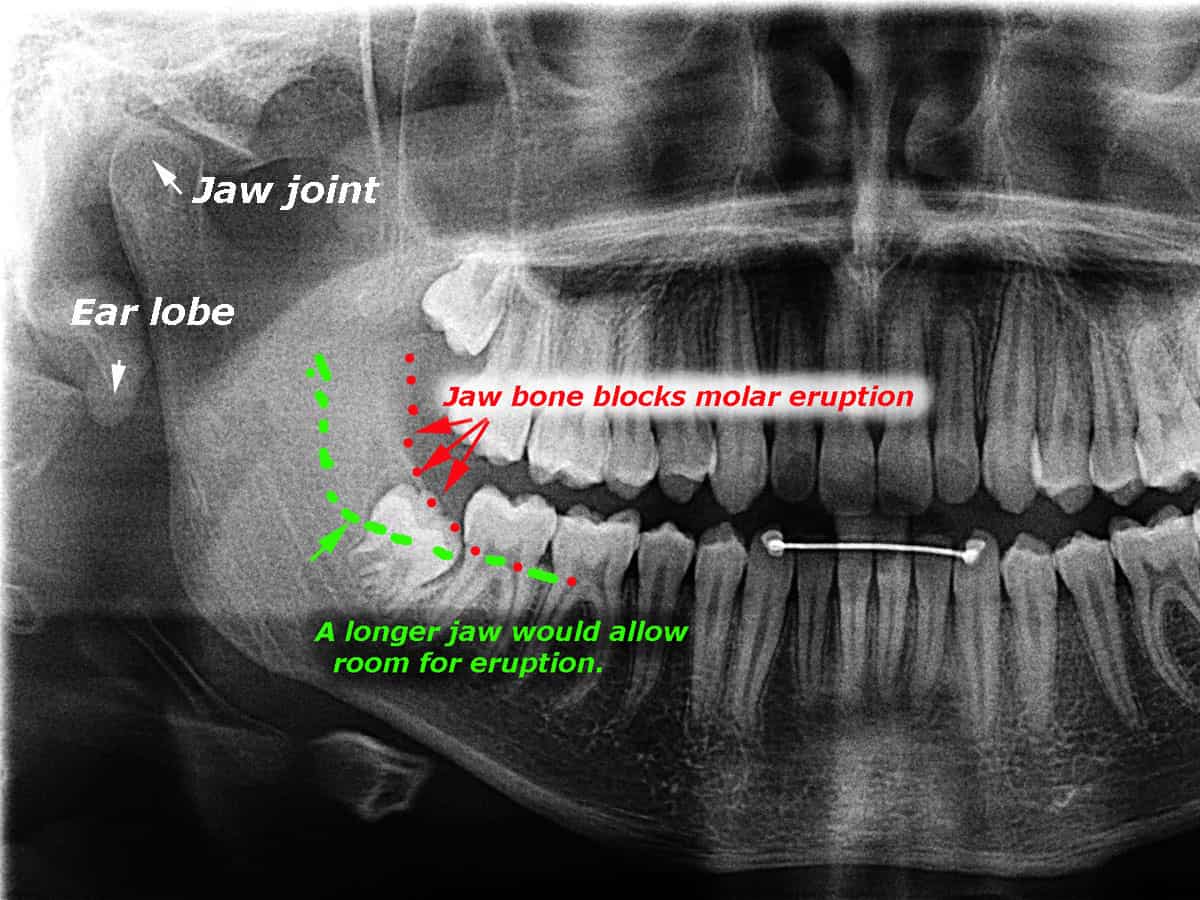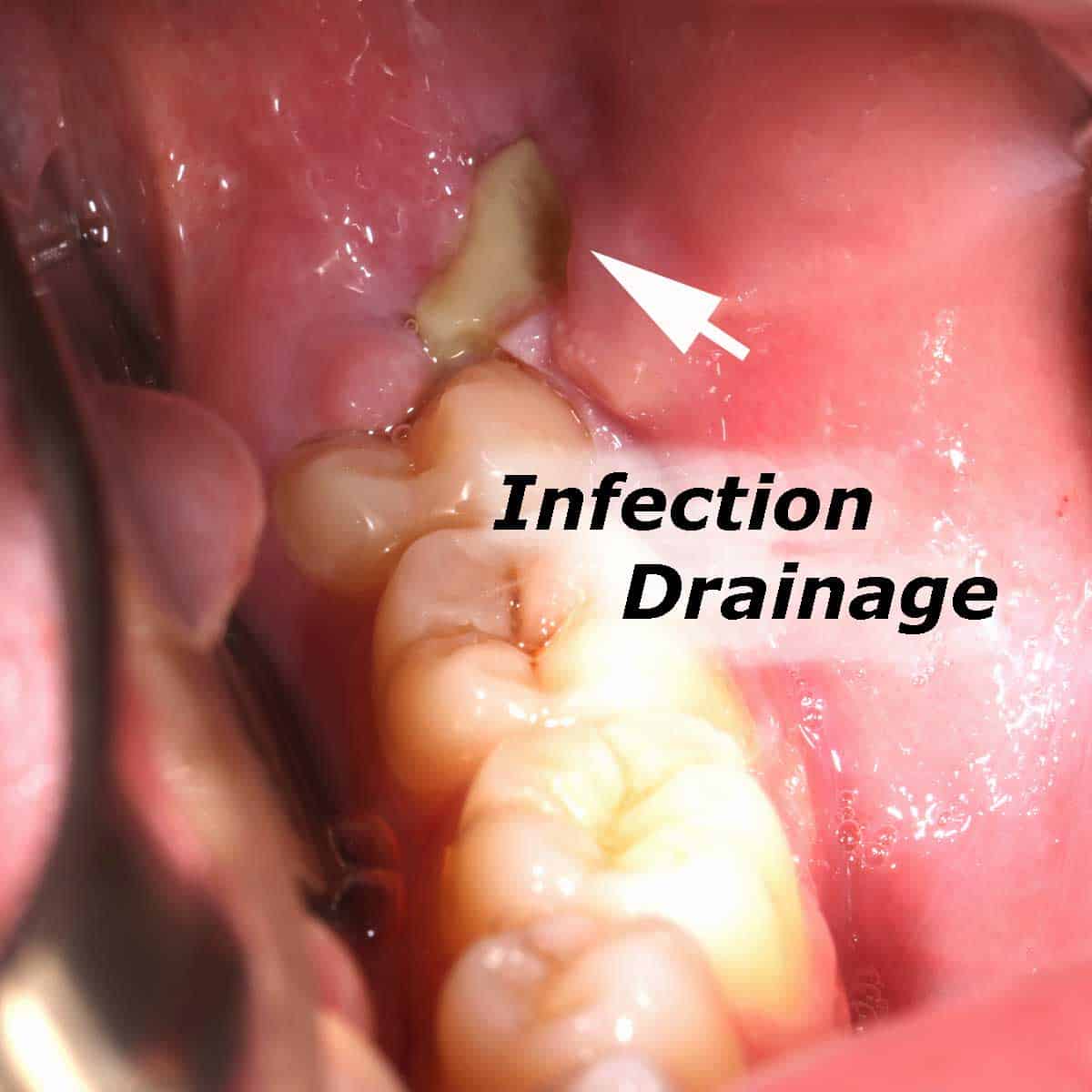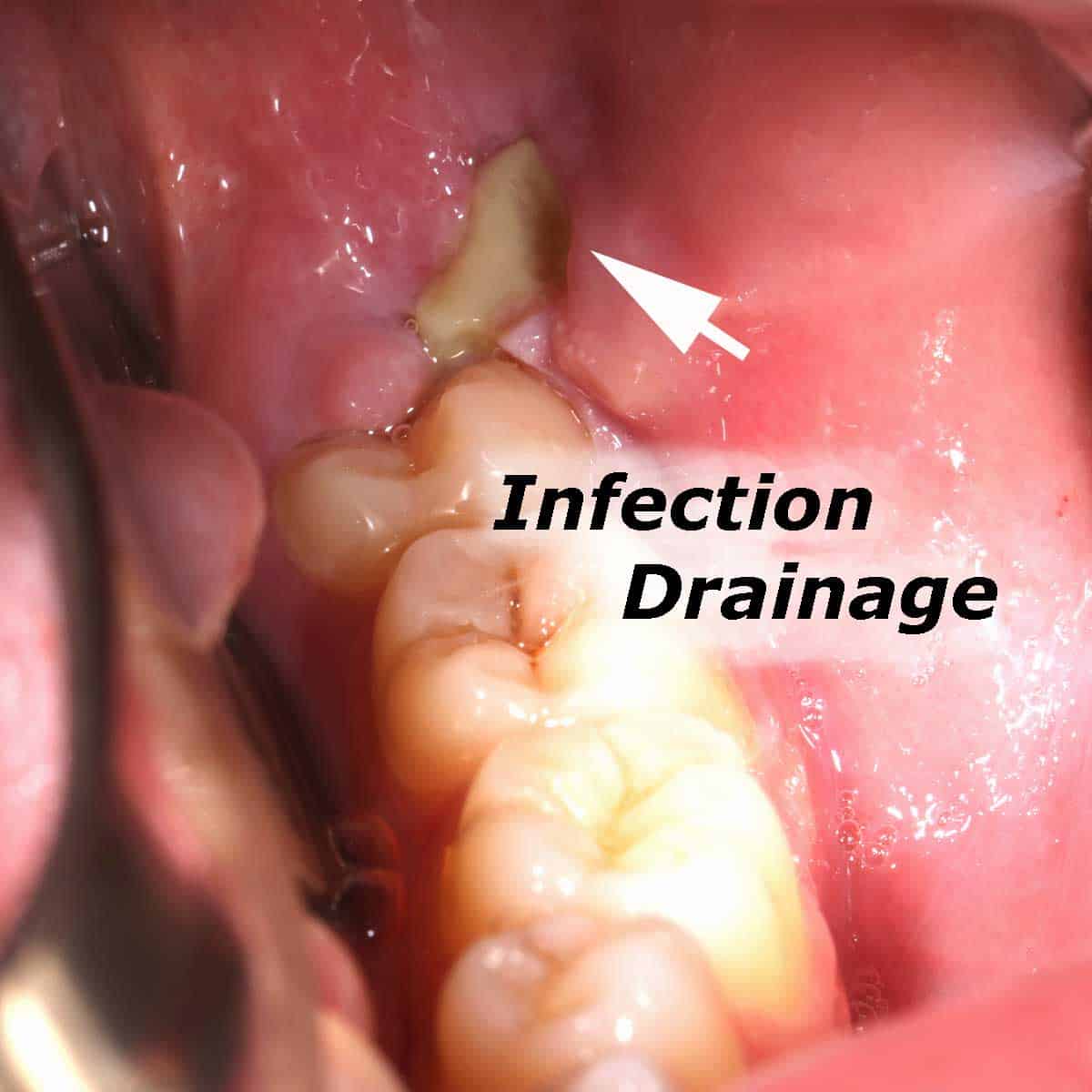Wisdom Tooth Removal: Why?
Dentists are commonly asked: Why wisdom tooth removal is recommended? It’s a good dental question and one that’s difficult to answer during a short in-office dental consultation. Intuitively, it seems wrong to remove wisdom teeth. After all, surely wisdom teeth, also called third molars, are in our mouths to fulfill a purpose. However, in most situations it is beneficial to have impacted third molars extracted between the ages of 17 -25.
If third molars fully erupt through the gum tissue and are easy to brush and clean, then it’s best to leave these teeth in the mouth. Unfortunately, often third molars do not have room to fully come through the gum tissue. Dental exams and radiography can be used to predict if there will be room as the jaw develops.
This blog post will answer the question of why wisdom teeth should be removed by demonstrating the unfortunate and often irreversible harm that may result when impacted third molars are not removed in a timely manner. Most importantly, if a persons wisdom teeth do need to be removed, this article will illustrate why it’s best and most comfortable to have third molars extracted before problems develop. Third molar surgery requires thoughtful decision making and planning, so that the result of treatment furthers the goal of achieving life-long dental health.
Jaw size and wisdom teeth?

When there is not enough room in the jaw for the back molars to completely erupt through the gum tissue, infections can develop. As a result of limited jaw size, a mound of sore gum tissue forms behind or on top of third molars. This tissue on top of partially erupted third molars is the most common dental complaint of people in their late teens and early twenties. Swollen and infected soft tissue that surrounds the wisdom tooth is named “pericoronitis” by dentists. Until a dentist can be seen, this swollen gum can be reduced by using salt water rinses 5 – 7 times per day.
What is wisdom tooth pericoronitis?
 Dentist’s refer to swollen and infected gum tissue surrounding or directly resting on the molars biting surface as a condition named pericoronitis. Due to a lack of jaw size, tissue can grow on top of the wisdom tooth’s biting surface. This happens because the jaw bone ascends too closely to the back of the molar. As a result, the tag of gum tissue gets chewed upon and irritated. Additionally, food particles and bacteria fester beneath the gum tissue causing infection.
Dentist’s refer to swollen and infected gum tissue surrounding or directly resting on the molars biting surface as a condition named pericoronitis. Due to a lack of jaw size, tissue can grow on top of the wisdom tooth’s biting surface. This happens because the jaw bone ascends too closely to the back of the molar. As a result, the tag of gum tissue gets chewed upon and irritated. Additionally, food particles and bacteria fester beneath the gum tissue causing infection.
Temporary relief of pericoronitis:
Rinsing with salt water, five to seven times per day, and taking non steroidal anti-inflammatory medicine can provide short term relief of pericoronitis. Simply add 1-1/2 teaspoons of table salt to a 12oz. bottle of water and shake to mix. Then sip, swish for 10 – 15 seconds and spit. Prepare a fresh new bottle of salt water each day because unwanted bacteria will contaminate the bottled water. See your dentist for treatment of pericoronitis as soon as possible because swelling can spread to the cheek and even more seriously to the floor of the mouth.
Draining third molar infections:
 Gum tissue has mounded over the back of this impacted wisdom tooth. As a consequence of the incomplete tooth eruption, bacteria has grown underneath the gum tissue. The position of the tooth disables the rinsing and cleansing action of saliva. Cleaning the tooth with a brush and floss is also made difficult because of the molars location.
Gum tissue has mounded over the back of this impacted wisdom tooth. As a consequence of the incomplete tooth eruption, bacteria has grown underneath the gum tissue. The position of the tooth disables the rinsing and cleansing action of saliva. Cleaning the tooth with a brush and floss is also made difficult because of the molars location.
Unfortunately, in this picture the yellowish island above the tooth represents purulent exudate draining from the infected area. Tissue swelling, known as cellulitis, has caused a fever and ballooning of the soft tissue on the side of the patients jaw.
Fortunately, with a dental examination, this condition can be foreseen. Often it is advisable to extract wisdom teeth before problems develop.
Can impacted third molars hurt other teeth?
 An impacted third molar that is positioned in direct contact with the root of the second molar can causes food and bacterial accumulation. Additionally, the intimate contact of the two molars prevents bone formation. Bone formation between the teeth would normally would cover and protect the root of the second molar from tooth decay.
An impacted third molar that is positioned in direct contact with the root of the second molar can causes food and bacterial accumulation. Additionally, the intimate contact of the two molars prevents bone formation. Bone formation between the teeth would normally would cover and protect the root of the second molar from tooth decay.
In this picture the wisdom tooth never caused any discomfort. However the root of the second molar was decayed beyond repair. Consequently both the second and third molar needed to be (pulled) extracted.
Can wisdom tooth removal prevent shifting or crowding?
 Controversy exists on whether or not impacted third molars cause front teeth to become crowded. On a dental x-ray, it looks very obvious that wisdom teeth push forward and cause the other teeth to shift. However most dentists agree, based on research, that third molar impactions do not cause teeth to shift.
Controversy exists on whether or not impacted third molars cause front teeth to become crowded. On a dental x-ray, it looks very obvious that wisdom teeth push forward and cause the other teeth to shift. However most dentists agree, based on research, that third molar impactions do not cause teeth to shift.
As it turns out, teeth continually move and shift throughout life. Generally the back teeth move forward. Additionally, if the lower and upper front teeth aren’t in nice edge-to-edge alignment, they will move forward and get crowded even if wisdom teeth are missing.
Third molar surgery: timing is everything.
So that the eruption of wisdom teeth can be monitored, it’s especially beneficial for teenagers and young adults to have regularly scheduled dental exams. This is because routine visits with panoramic radiographs allow dentists to determine if and when wisdom tooth removal is recommended. This is important because, if extraction is necessary, properly timing the removal will help to provide less complicated and more comfortable third molar surgery.
Spring and summer is usually the best time to have teeth checked and third molars extracted, if needed. College aged students frequently struggle with unexpected jaw pain. This is an extraordinary challenge when they attend school away from home and are without parental support.
It’s important to note that problems associated with wisdom teeth can’t always be fixed after they occur. For example: tooth root damage and the spread of periodontal disease can lead to tooth loss latter in life. Therefore, the decision to extract molars need to be carefully considered.
For most young people wisdom tooth removal helps to prevent cavities on neighboring teeth, gum tissue swelling, jaw bone infection, periodontal disease, pain and discomfort.
Hopefully this information on wisdom teeth is helpful. Please feel free to respond with any questions, comments or requests for additional information.
Author:
Roman Kotlarek, D.D.S. practices in West Houston, TX and has reputation for gently removing wisdom teeth with the benefit of I V sedation to minimize discomfort. If you have questions about wisdom teeth removal or want to schedule an appointment, please call Roman Dental at (281) 920-4200. Alternatively, book an in office consultation 24/7 online at www.romandental.com
D/B/A: Roman Dental, 14535 Memorial Drive, Houston, TX 77079 www.romandental.com










